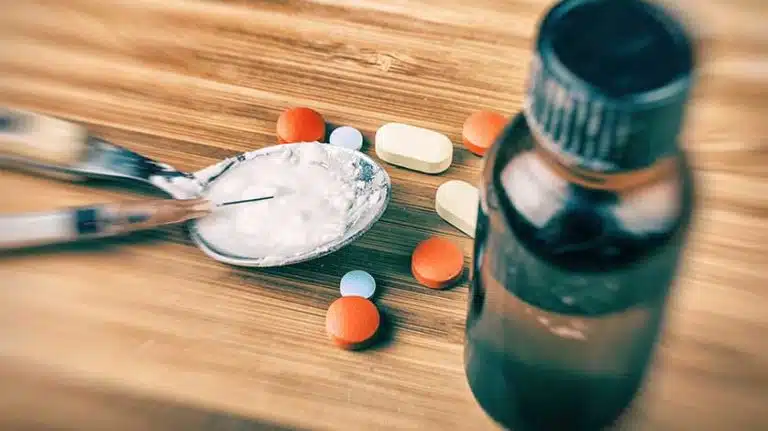7 Of The Most Dangerous Opioids In America

Opioids are substances that provide pain relief. These prescription drugs change how your body responds to pain by activating opioid receptors throughout your nervous system.
Along with treating pain, opioids can also cause euphoria (intense joy). That’s why many people abuse them. Opioid abuse poses serious dangers, including opioid addiction (also called opioid use disorder) and fatal overdose.
Some opioids are more dangerous than others, but all opioids can harm your health when used in a manner not prescribed by a health care provider. Here are the most dangerous opioids in the United States.
Fentanyl
Fentanyl is a synthetic opioid used to treat severe pain. According to the Centers for Disease Control and Prevention (CDC), fentanyl is up to 100 times stronger than the natural opioid morphine and up to 50 times stronger than the illegal opioid heroin.
It’s not only one of the most potent opioids but also one of the most dangerous drugs in general. In recent years, fentanyl has been linked to numerous drug overdose deaths.
Because it’s relatively cheap to manufacture, some drug traffickers secretly add it to other substances, including methamphetamine, cocaine, and heroin. That means that whenever you buy drugs off the street, you could unknowingly ingest fentanyl.
Carfentanil
Carfentanil is a fentanyl analog, which means it’s chemically similar to fentanyl. However, it’s 100 times stronger. It’s also 10,000 times stronger than morphine.
Since it’s so powerful, carfentanil is not intended for human use. Instead, veterinarians use it to tranquilize elephants and other large animals. Even a very small amount of carfentanil can be deadly when ingested by a human.
Like fentanyl, carfentanil is sometimes added to other street drugs without the buyer’s knowledge.
Heroin
Heroin is an illicit drug made from the natural opioid morphine. It’s a popular street drug that’s typically injected, snorted, or smoked.
No matter how you use it, heroin quickly causes a rush of good feelings, which makes it extremely addictive. People who are addicted to heroin face a variety of health risks, including infectious diseases like HIV/AIDS from sharing needles and other heroin paraphernalia.
In addition, although it’s not quite as deadly as fentanyl or carfentanil, heroin poses a high risk of fatal overdose.
Morphine
Morphine is a natural opioid made from the opium poppy plant. It’s prescribed to treat moderate to severe pain, including chronic pain and postsurgical pain.
When abused, morphine can cause addiction and overdose. That’s why most doctors only prescribe the drug in small amounts for short periods of time.
Oxycodone
Like morphine, oxycodone is a prescription opioid that can treat moderate to severe pain. It’s often prescribed under the brand names OxyContin and Percocet.
When used in a manner not prescribed, oxycodone is highly addictive. Oxycodone drug use can also cause a deadly overdose.
Hydrocodone
Hydrocodone is a prescription opioid used to treat severe pain. This painkiller is prescribed under brand names such as Vicodin, Norco, and Lortab. When misused, it often causes addiction and overdose.
Methadone
Methadone is a synthetic opioid that’s chemically similar to morphine but more powerful. It’s prescribed to treat severe pain. It’s also sometimes used to reduce or prevent withdrawal symptoms in people who are addicted to other opioids.
People who abuse methadone face a high risk of overdose and addiction.
How To Reduce The Risks Of Opioids
It’s important to use opioid pain relievers exactly as your doctor instructs. Never take higher or more frequent doses than prescribed. Also, tell your doctor about any other medications you take, and do not mix opioids with alcohol.
If you feel unable to control your use of an opioid, you may be struggling with opioid addiction. Common signs of opioid addiction include:
- tolerance (needing increasingly higher or more frequent doses of an opioid to feel the desired effects)
- physical dependence (experiencing withdrawal symptoms, such as sweating and anxiety, when you don’t use opioids)
- inability to feel pleasure without opioids
If you or someone you love experiences these symptoms, seek help at drug abuse and addiction treatment program.
Keep Naloxone On Hand
In addition, while taking a prescription opioid, consider keeping naloxone on hand. Naloxone (brand name Narcan) is a medication that can quickly reverse the effects of an opioid overdose. You can get it from most pharmacies without a prescription.
Recognize The Signs Of Opioid Overdose
You should also learn the signs of opioid overdose, which include:
- smaller pupils
- cold, clammy skin
- bluish lips and/or fingernails
- slowed or stopped breathing
- slowed or stopped heart rate
- loss of consciousness
If you or someone you know experiences these symptoms, administer naloxone, and call 911 right away.
If you or a loved one struggles with opioids, please contact an Ark Behavioral Health specialist. Our substance abuse treatment programs offer medical detox, mental health counseling, and a variety of other services to help you stay healthy and drug-free.
Written by Ark Behavioral Health Editorial Team
©2024 Ark National Holdings, LLC. | All Rights Reserved.
This page does not provide medical advice.
Centers for Disease Control and Prevention - National Vital Statistics Reports
Centers for Disease Control and Prevention - Fentanyl Facts
United States Drug Enforcement Administration - Carfentanil: A Dangerous New Factor in the U.S. Opioid Crisis
United States National Library of Medicine - Opioid Misuse and Addiction

Questions About Treatment?
Ark Behavioral Health offers 100% confidential substance abuse assessment and treatment placement tailored to your individual needs. Achieve long-term recovery.
100% confidential. We respect your privacy.
Prefer Texting?
Our friendly support team is here to chat 24/7. Opt out any time.







 Learn More
Learn More








